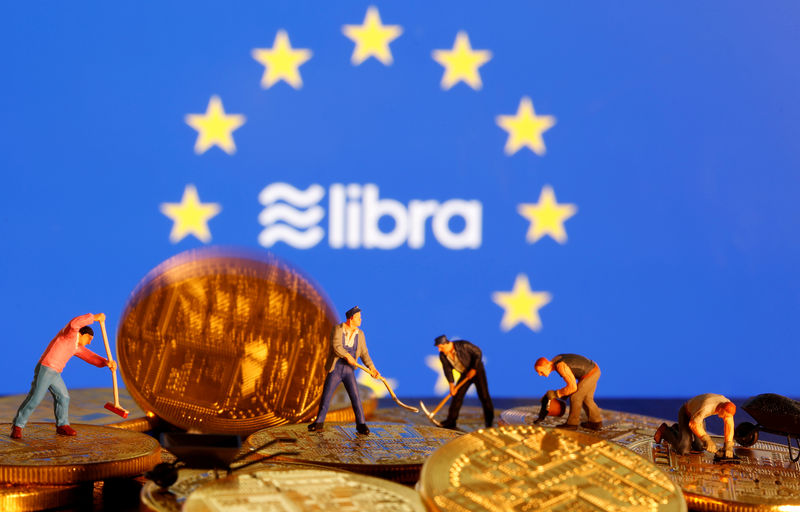By Tom Wilson
LONDON (Reuters) - Central banks are looking at creating their own digital currencies - a stark contrast to the ethos of cryptocurrencies that seek to subvert mainstream authority over money.
While there is little consensus on how such currencies might take off, some countries such as the United States and European nations are looking at the concept, while China is the global frontrunner in a drive to make its own digitized money.
The European Union, worried that Facebook's Libra cryptocurrency could erode state control over money, has urged the European Central Bank to look at issuing its own digital currency, a draft document seen by Reuters shows.
Here are some key questions on the rise of central bank digital currencies (CBDCs) and their progress in entering the mainstream.
ARE CBDCs DIFFERENT TO CRYPTOCURRENCIES?
Yes - and fundamentally so.
CBDCs are traditional money, but in digital form; issued and governed by a country's central bank. By contrast, cryptocurrencies like bitcoin are produced by solving complex maths puzzles, and governed by disparate online communities instead of a centralized body.
The common denominator is that both cryptocurrencies and CBDCs, to a varying degree, are based on blockchain technology, a digital ledger that allows transactions to be recorded and accessed in real time by multiple parties.
While some retailers accept bitcoin as a form of payment, cryptocurrencies are not recognized as legal tender - which CBDCs, by definition, would be.
And unlike central bank money, both traditional and digital, the value of cryptocurrencies is determined entirely by the market, and not influenced by factors such as monetary policy or trade surpluses.
AND WHAT ABOUT ELECTRONIC CASH?
The rise of technology like contactless debit cards has made it easier for consumers and businesses to use electronic cash, or e-money, to pay for goods and services.
But this also differs to CBDCs.
Electronic cash, defined by the Bank for International Settlements as a store of value for making payments to retailers or between devices, is usually held at banks or on pre-paid cards or digital wallets such as PayPal.
CBDCs would not merely be a representation of physical money, as is the case with electronic cash, but a complete replacement for notes and coins.
SO WHAT ARE THE ADVANTAGES OF CBDCs?
Central banks think CBDCs could make payments systems, which are often time-consuming and costly, more efficient, reducing transfer and settlement times and thus stoking economic growth.
Some central banks think CBDCs could also counter the rise of cryptocurrencies issued by the private sector such as Libra, planned for launch in June 2020.
Bitcoin and other virtual currencies, hampered by wild volatility, have presented few realistic threats to central bank control over money. But central bankers fret that Libra could reach billions and quickly erode sovereignty over monetary policy.
CBDCs, they think, could address problems like inefficient payments that cryptocurrencies seek to solve, while maintaining state control over money.
In the era of negative interest rates, CBDCs are also seen as offering a tool to control over how businesses and people use money. CBDCs, the argument goes, could be used to charge households and businesses to hold cash, forcing them to spend and invest and stimulating growth.
ARE CBDCs CLOSE TO BECOMING REALITY?
Increasingly so - though most CBDCs are still in very early or conceptual stages.
While central banks across the world have in recent years researched the concept, China is closest to becoming the first major country to introduce a CBDC.
While details of its project to build a digital renminbi are scarce, it will be powered in part by blockchain technology and will initially be issued to commercial banks and other financial institutions.
China's move may push other central banks to take action.
Last month, the president of the Federal Reserve Bank of Philadelphia said last month it was "inevitable" that central banks, including the U.S. Federal Reserve, would start issuing their own digital currencies.
ARE MOST MAJOR CENTRAL BANKS SUPPORTIVE?
Not quite.
Caution and scepticism exists in many quarters. The Bank of Japan, for example, has warned that uncertainties over the impact of CBDCs on commercial banking must be addressed.
The BOJ has also scotched the idea that CBDCs could boost the effectiveness of negative interest rate policies.

Some households and companies, it thinks, would hoard traditional cash to avoid being charged for holding digital currencies if central banks were to issue and apply negative rates on them.